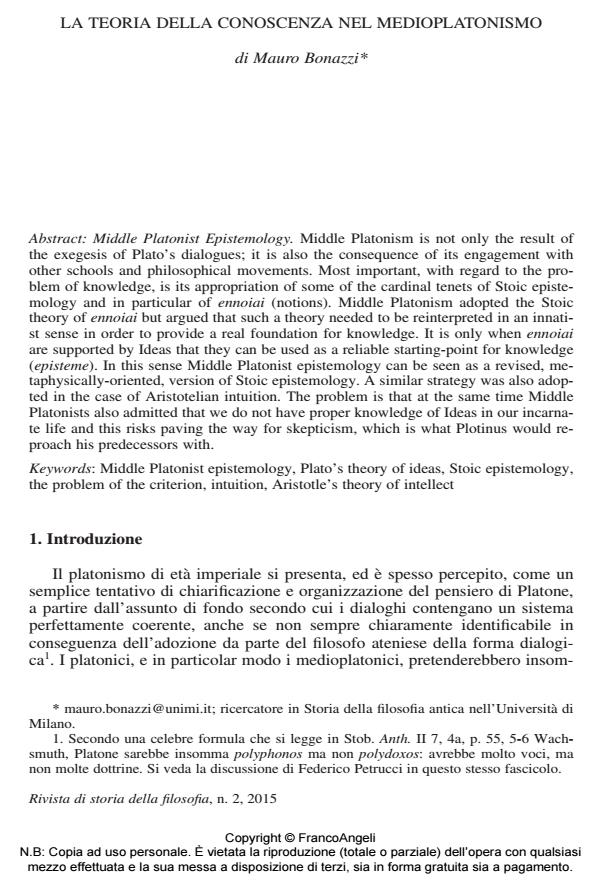Middle Platonist Epistemology
Journal title RIVISTA DI STORIA DELLA FILOSOFIA
Author/s Mauro Bonazzi
Publishing Year 2015 Issue 2015/2
Language Italian Pages 19 P. 339-357 File size 101 KB
DOI 10.3280/SF2015-002004
DOI is like a bar code for intellectual property: to have more infomation
click here
Below, you can see the article first page
If you want to buy this article in PDF format, you can do it, following the instructions to buy download credits

FrancoAngeli is member of Publishers International Linking Association, Inc (PILA), a not-for-profit association which run the CrossRef service enabling links to and from online scholarly content.
Middle Platonism is not only the result of the exegesis of Plato’s dialogues; it is also the consequence of its engagement with other schools and philosophical movements. Most important, with regard to the problem of knowledge, is its appropriation of some of the cardinal tenets of Stoic epistemology and in particular of ennoiai (notions). Middle Platonism adopted the Stoic theory of ennoiai but argued that such a theory needed to be reinterpreted in an innatist sense in order to provide a real foundation for knowledge. It is only when ennoiai are supported by Ideas that they can be used as a reliable starting-point for knowledge (episteme). In this sense Middle Platonist epistemology can be seen as a revised, metaphysically- oriented, version of Stoic epistemology. A similar strategy was also adopted in the case of Aristotelian intuition. The problem is that at the same time Middle Platonists also admitted that we do not have proper knowledge of Ideas in our incarnate life and this risks paving the way for skepticism, which is what Plotinus would reproach his predecessors with.
Keywords: Middle Platonist epistemology, Plato’s theory of ideas, Stoic epistemology, the problem of the criterion, intuition, Aristotle’s theory of intellect
- Note sul significato di notitia/notities in Lucrezio Carlo Delle Donne, in Rivista di Filologia e di Istruzione Classica /2021 pp.26
DOI: 10.1484/J.RFIC.5.127348 - A Discussion of M. Bonazzi, À la recherche des idées Federico M. Petrucci, in Mnemosyne /2018 pp.351
DOI: 10.1163/1568525X-12342294
Mauro Bonazzi, La teoria della conoscenza nel medioplatonismo in "RIVISTA DI STORIA DELLA FILOSOFIA" 2/2015, pp 339-357, DOI: 10.3280/SF2015-002004